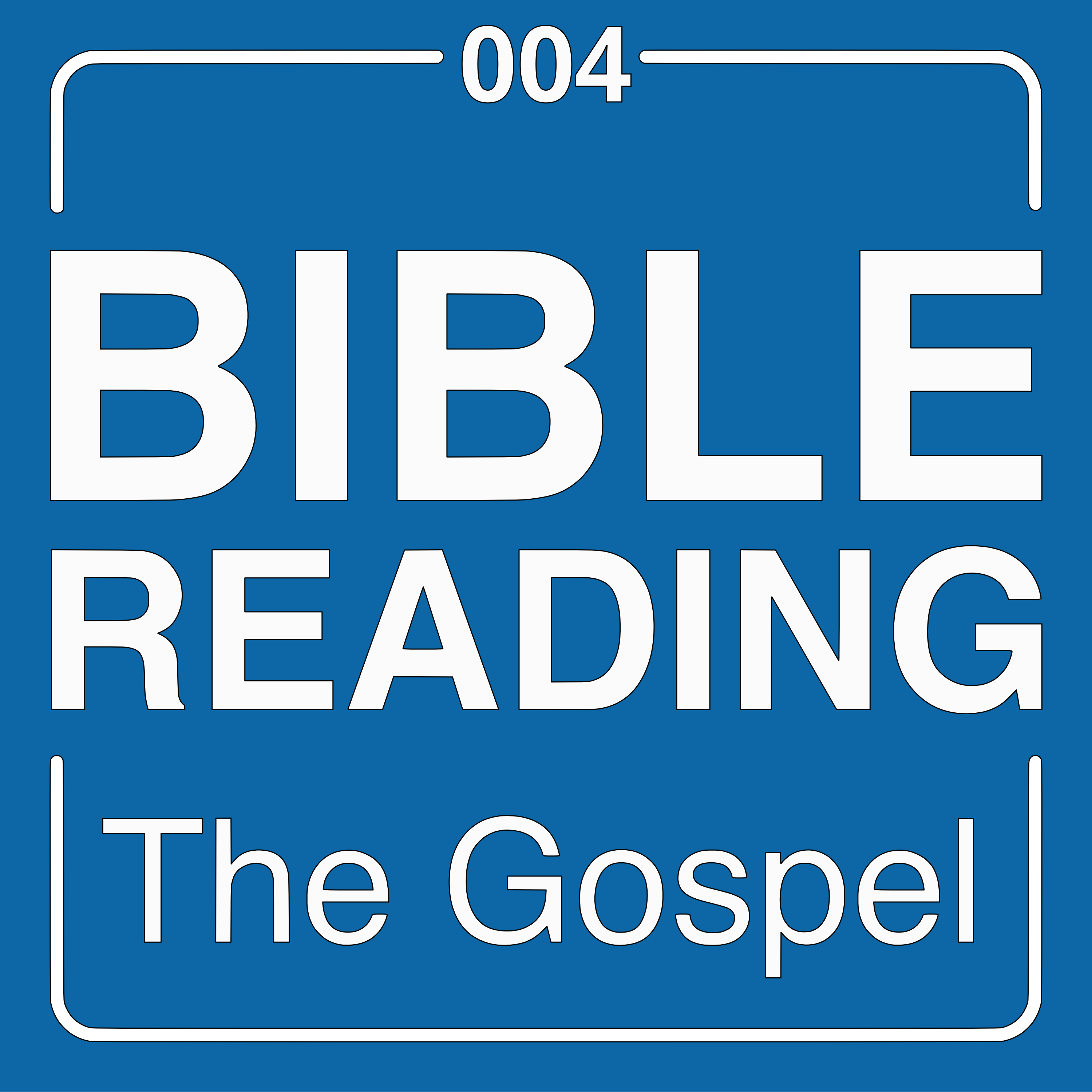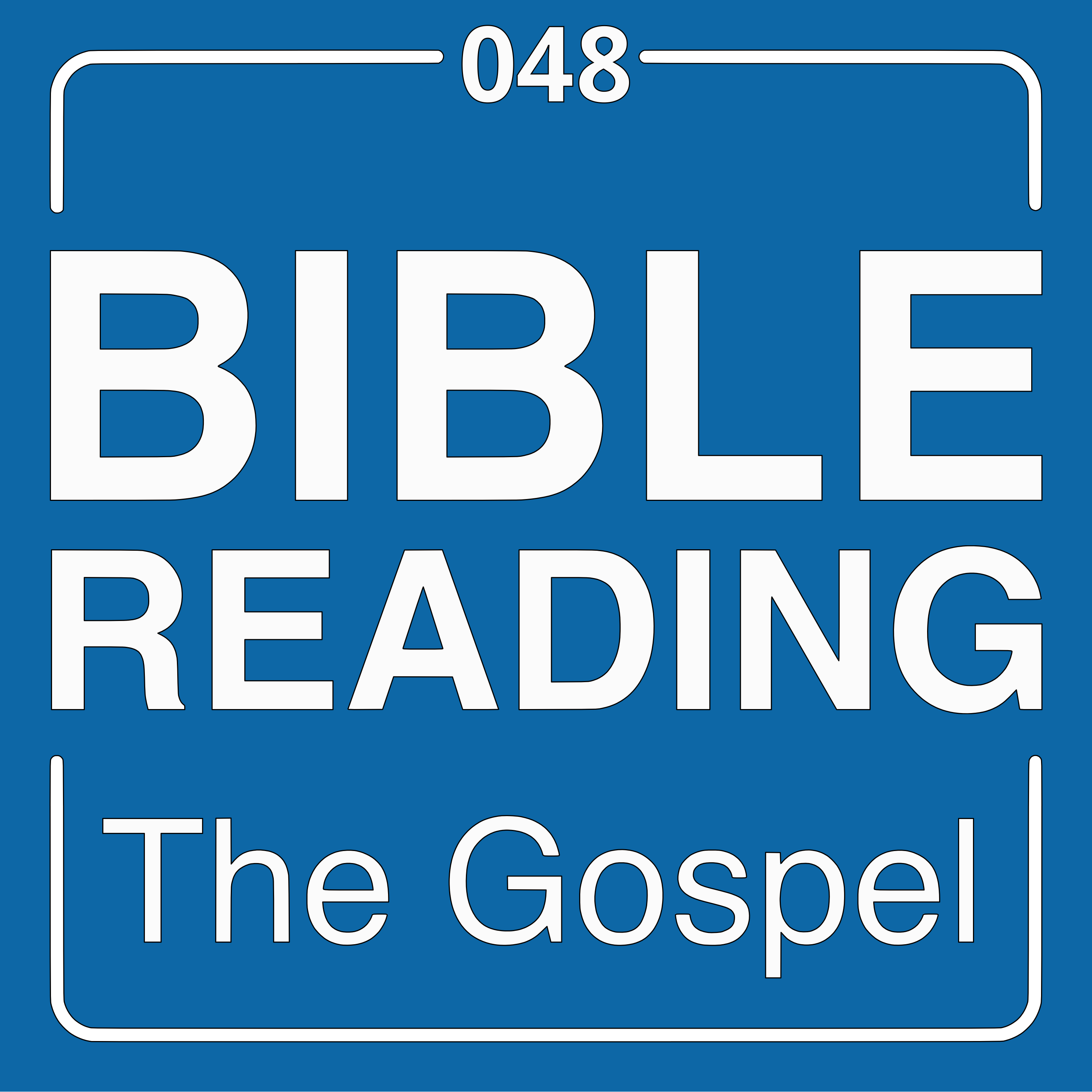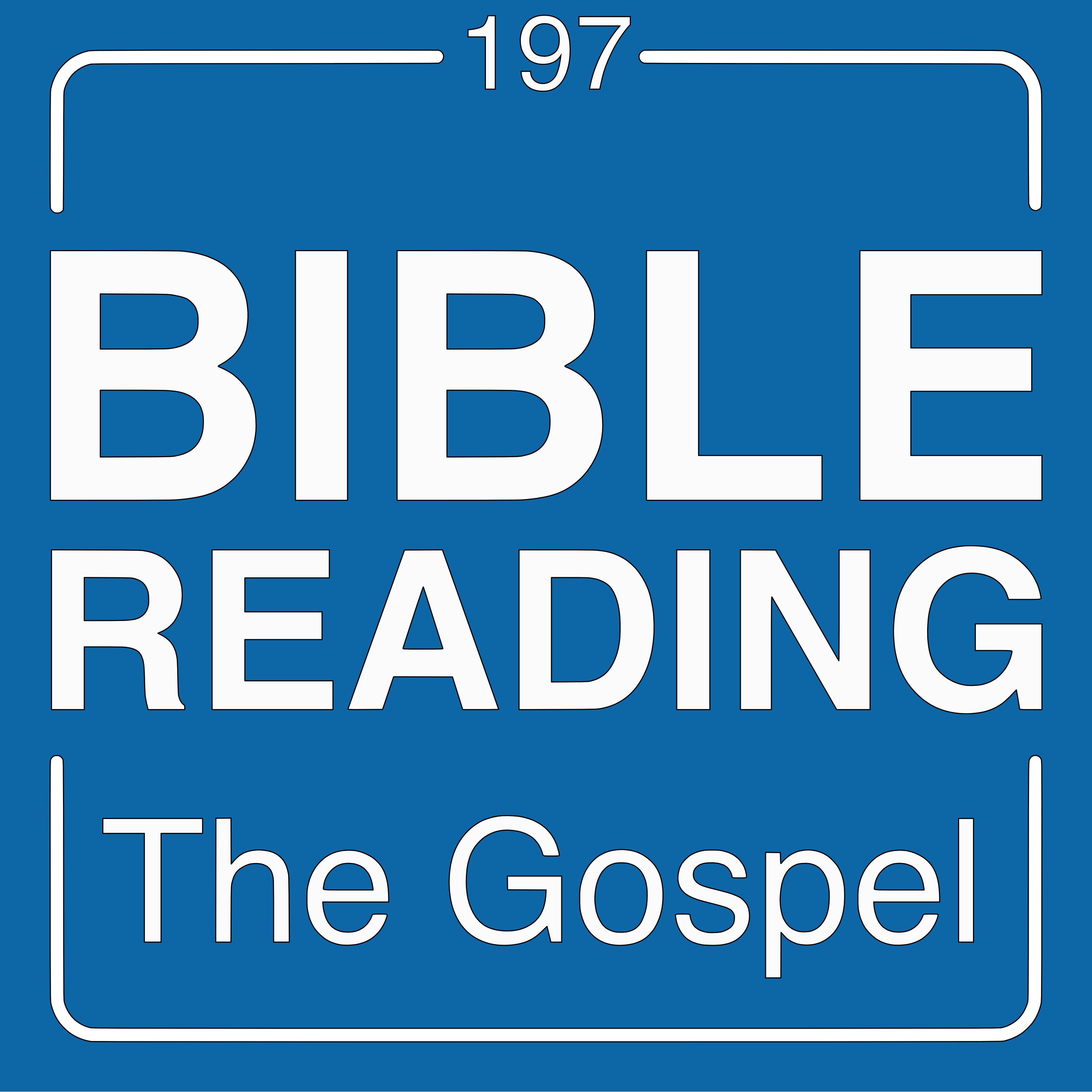Episode Transcript
[00:00:24] Speaker A: Hi, I'm Josh.
[00:00:25] Speaker B: And I'm Gabriel.
[00:00:26] Speaker A: Today on reading the Gospel, we are studying the event final public message. This is found in John 12:37 50. Follow along with us as we read.
[00:00:37] Speaker B: Although Jesus had performed so many miraculous signs before them, they still refused to believe in him so that the word of Isaiah, the prophet would be fulfilled. He said, lord, who has believed our message and to whom has the arm of the Lord been revealed?
For this reason they could not believe because again Isaiah said, he has blinded their eyes and hardened their heart so that they will not see with their eyes and understand with their heart and turn to me and I would heal them.
Isaiah said these things because he saw Christ's glory and spoke about Him.
Nevertheless, even among the rulers, many believe in Him. But because of the Pharisees, they would not confess Jesus to be the Christ, so that they would not be put out of the synagogue. For they loved praise from men more than praise from God.
[00:01:45] Speaker A: And Jesus cried out and said, whoever believes in me, believes not in me, but in him who sent me. And whoever sees me, sees him who sent me. I have come into the world as a light, so that whoever believes in me may not remain in darkness. If anyone hears my words and does not keep them, I do not judge him. For I did not come to judge the world, but to save the world. The one who rejects me and does not receive my words has a judge. The word that I have spoken will judge him on the last day. For I have not spoken on my own authority. But the Father who sent me has himself given me a commandment what to say and what to speak. And I know that his commandment is eternal life. What I say, therefore I say as the Father has told me.
So this section concludes Jesus public ministry on earth this three and a half years and the next events he's going to go off to the feast and head will start the events that lead up to the crucifixion.
We can kind of look at this as the final message. What is important?
I think of when I'm instructing a group, a group of kids, teaching them something we're going to go through. You go through, you teach everything. And then at the end you reiterate the most important point. And so I see personally this section as a very important message to us in the world. What Jesus wants to share this last public declaration to Israel before he heads to the cross.
[00:03:36] Speaker B: It's a summary of all messages of.
[00:03:38] Speaker A: Jesus Christ before we get into the Red Letter. If you have a Red Letter Bible, let's back up because it starts with this quotation from Isaiah.
And this quotation says, lord, who has believed what he heard from us, it goes down. He's blinded their eyes and hardened their hearts in verse 40. Lest they see with their eyes and understand with their hearts and turn and I would heal them. So is Isaiah telling us that God, let's use the word, predestined the Pharisees for hell, that he predestined them to not accept the message to turn, and no matter what they did, they were stuck because Isaiah wrote this.
[00:04:32] Speaker B: When we study a specific verse, we have to look at the context and also to compare with the other parts of the Bible which are addressing the same topic. So when we put all this together, we realize that our God is a loving God who created us into his image and he endowed us with free will as he is a free will person.
And because we have that free will and we have the freedom to choose, we are accountable for the choices that we make.
So from this perspective and many other Bible verses, when God places two options before us and says, choose right from the Old Testament all the way to the New Testament, we understand that God is presenting the future to us. Of course he knows the future, because God knows the end from the beginning, but we do not know it. When you get to a situation like this, we may have the feeling that God has predestined or set some people on a specific course and they have no freedom to choose. But that is not the case.
It is the result of our choices that the eyes become blind, sin is blinding us. Or that our hearts become hardened. In the beginning, they are soft and we hear the whisper of the Holy Spirit, the invitation of God. But after a while, if we reject those invitations over and over, the heart becomes hardened.
[00:06:18] Speaker A: Yeah, and we see this with individual people. There could be a public figure that when they speak, there are people who draw closer to them and there are people who draw further away from them that say, this person speaks what I agree with, and they grow closer and closer. And then someone else, I don't agree with them, and they draw further away. And so it's not that the presenter is speaking two different ways to two different people, it's how we receive it. And we've seen this with Pharaoh and many different people. So what's interesting, John actually clarifies this and said Isaiah said these things because he saw his glory and spoke of him. You know, Isaiah has visions. And so in, I wonder if in vision he came down and he saw these events and he saw this. And so, like you said, God knows Ian from the beginning. Just because he tells us what's going to happen, it doesn't mean he makes it happen.
He knows the choices we're going to make, and he's just telling us, look, this is history. Prophecy is history before it happens. He's just prophesying, saying this is history. And for us, we look back and the cross is now history for us.
But for Isaiah, it was future.
I think that's very important that we understand that we are not predestined before we're even born to go to heaven or hell, despite our desires.
In fact, the Bible says we're all predestined for salvation, right?
[00:08:02] Speaker B: Absolutely.
[00:08:02] Speaker A: That every single one of us. Jesus died on the cross and he made that destiny for us, but he's not going to force it on us.
[00:08:11] Speaker B: He wants everyone to be saved.
[00:08:13] Speaker A: Yeah. Which leads to the second point of this.
The second point of this section where Jesus cries out and says this. This is not just him sitting with a crowd. And, hey, you know, the kingdom of heaven is like. This is him crying out.
And this important message that he shares, what is in this message that he shares with us?
[00:08:40] Speaker B: And I really like to reemphasize what you said. Jesus Christ shouted out.
When you have something important to say, you are going to say it out loud, with conviction, with passion. And this is why Jesus Christ wanted everyone to hear this message. And by the way, in the same way Jesus shouted out this message at the end of his ministry, in the same way, God's invitation would be shouted out louder and louder towards the end of time.
And Jesus himself said in Matthew 24:14 that when the gospel will be preached out loud so everyone will hear it, that is the end that Jesus comes.
So coming back to your question, the message that Jesus Christ shouted out is about himself.
The one who believes in me does not believe in me, but in one who sent me.
So I have come as a light into the world so that everyone who believes in me should not remain in darkness. It is God's last invitation to come out of this darkness.
I see this message as being the summary of the whole gospel of Jesus Christ. It is so important to emphasize that our whole podcast, the Gospel and How to Read the Gospel is summarized in this passage.
It is a call. The Gospel is the good news that the light is here.
You should not have to live in darkness for the rest of your life.
There is a better way. There is a way out. And that way is Jesus Christ. He Says, I am the way, I am the life. If you come out of this darkness, you will live.
And he says, by the way, if you reject my offer, you will remain in darkness, and it will be a day of judgment. But for now, Jesus said, I didn't come to judge you. I came to invite you. It is a very similar message than in Luke 19:10, when Jesus says, I came to seek and save the lost.
[00:11:05] Speaker A: And it is the word that judges us. You know, God has revealed his character to us in the Bible. He has revealed who he is.
We often think of the woman with scales in her hands, with the blind photon, you know, the justice. And is the balance higher on one side or the other? And we get this idea of the final judgment, that when we go to heaven, there's going to be the good things we did and the bad things we did. And if the good things outweigh the bad things, we're going to be saved. And this is the picture that's out there, but it's a false picture because we are saved by Jesus Christ coming to this earth, living a sinless life and dying.
And then that death, that unjust death, he didn't deserve to die. The Bible says the wages of sin is death.
So when he died, he took our sins, your sins, my sins, everyone's sins, he died for those sins, so they've been paid for.
And Christ came to do that. He came to save us. And that's how we are saved, is by saying, christ, thank you for dying on the cross. I accept that substitution. I accept your death from mine.
Now please change me.
And so when I get up to heaven, how good or how bad, the amount of good or bad I have has nothing to do with my salvation. It's, did I accept the gift?
[00:12:40] Speaker B: In fact, that is a wrong theology developed by Thomas Aquinas during the Middle Ages.
It is called a theology of the merits. And that's not biblical.
[00:12:53] Speaker A: No.
[00:12:54] Speaker B: It is Jesus Christ who is offering salvation once again. And this time, salvation is a way out of darkness.
And in the second part of his speech, he underlines this idea that he has the right to call us out of darkness and to offer this new way of light. Because he is Messiah, because God is his Father, and God has sent him to do this.
[00:13:27] Speaker A: And if we look at the Bible, what the Bible says in general, the Bible says that those who have accepted the gift, they're going to be changed. That the Holy Spirit convicts us, he brings us to repentance, he changes us. That the Bible says that he who began a good work in us, will be faithful to complete it. So someone who has accepted the gift of Jesus Christ will have fruit in their life that they are loving, kind, joyful, long suffering, patient, good.
That's going to be evidence in their life. It's just, it's what happens when we're saved. And so this is where it's saying, you know, when we look at the Word, we'll see, okay, in their life, has something changed in their life.
So they're not being saved because of the change, they're being saved because of Jesus. But because they're saved, there is change.
[00:14:32] Speaker B: Yes. And one more word about Jesus Christ. I like how he finishes this message.
I say, just as the Father has told me, in other words, I was faithful based on the parable of the talents in the day of Judgment. The only thing that God requires from us is faithfulness. Jesus said, I was faithful to the mission that God entrusted me. And I like to apply this for me. This is how this passage is speaking to me. Be faithful. Be faithful in coming to Christ every day, opening the Bible to hear God's word and be faithful in fulfilling what God tells you to do.
[00:15:16] Speaker A: Let us pray.
Father God, may we be faithful.
May we be faithful in accepting salvation today, Tomorrow, next year, 10 years from now, until Jesus comes.
May we be faithful in surrendering our lives to you.
And as Gabriel said, may we be faithful in that daily connection with you, waking up each morning and spending time reading your Word, talking to you in prayer and seeking to hear a message.
So please come and complete that work that you've promised to do in us in Jesus name, Amen.
[00:15:56] Speaker B: Amen.



